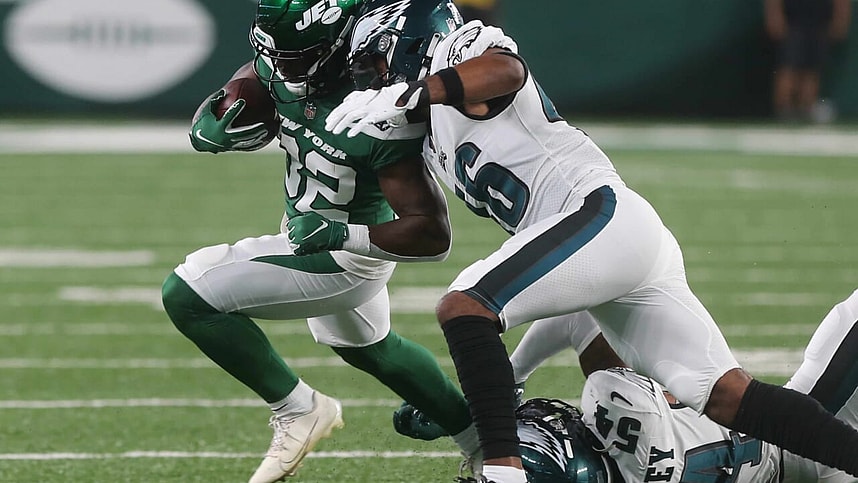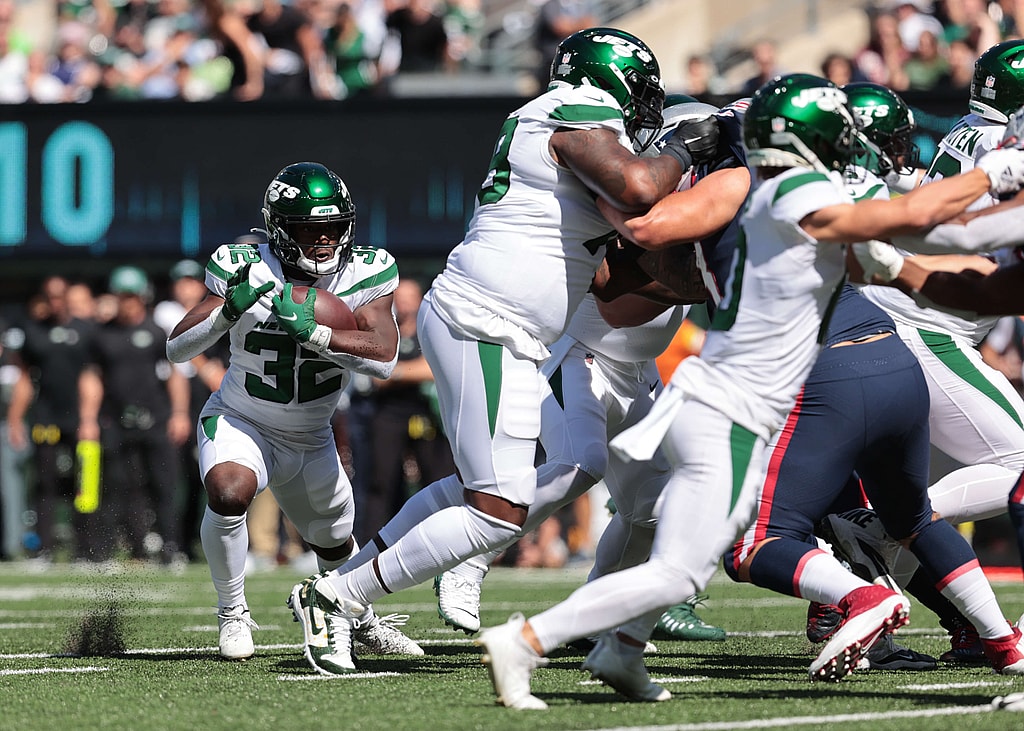
As Zach Wilson struggles to find his NFL footing, the New York Jets’ run game could become a vital source of offensive stability.
Michael Carter breaking all the tackles. #TakeFlight
?: #NEvsNYJ on CBS
?: NFL app pic.twitter.com/gbemrhnZUe— NFL (@NFL) September 19, 2021
Offensive salvation may have made its way to the New York Jets through the 2021 NFL Draft. But the Cleveland-based gift might’ve arrived not on Thursday of the proceedings…but Saturday.
To the surprise of no rational Jets fan, Zach Wilson’s arrival wasn’t a one-size-fits-all instant fix for New York’s green team. Calling for Wilson’s dismissal and closing the book on his Jets career after two games is asinine but there’s no denying that Gang Green needs to develop some sort of offensive momentum, even if the results don’t translate on the scoreboard.
As one rookie has faltered, it might be prudent to turn over further trust to another: It may be time to give the Michael Carter project a jumpstart…the running back, that is (though the similarly-named safety has likewise done his part on defense).
Yes, turning the offensive reigns over to a rushing attack seems archaic by 2021’s professional football standards. But, as we know by now, the Jets aren’t really in any position to turn any form of offensive assistance. The unit has pulled itself out of the cesspool that Adam Gase dragged them into, as their 336-yard output on Sunday against New England bested their tallies in all but two games from last season. But if the Jets want to look at a 2021 season that likely won’t end in the postseason with proud eyes, they need to push the offense in the right direction.
Nothing more needs to be written about the Jets’ perpetual search for a franchise quarterback but a leading rusher has proven equally elusive. No Jets rusher has reached four digits in yardage since Chris Ivory in 2015, three years after Shonn Greene became the most recent homegrown back to do so.
It’s incredibly easy to understand why the Jets would be reluctant to turn over major offensive responsibilities to the run game. The last time they tried that, they got burdened with Le’Veon Bell drama and $4 million in dead cap space. It’s going to be a long time before the Jets ever break the bank open for a rusher and they’re not exactly hiding their minimalist approach: whereas Bell’s four-year deal was worth $52 million, the contracts of the six rushers currently stationed on the Jets’ roster are worth just about a quarter of that.
But the bargain bin, as anyone who has spent ten minutes in their local Target can testify, can yield delightful prizes. The early returns on Carter, and some of his rushing compatriots, suggest he could become a buried cult classic, like a copy of Idiocracy with a $3.99 price sticker. The Meadowlands complex is well-known for hosting the game-changing antics of one North Carolina alum with the surname of Carter. A path is set for another to do the same.
Carter has the makings of a popular fantasy football waiver wire option as the season goes on. The former Tar Heel, subtly slid under the radar in the fourth round as April became May. He currently stands as the fourth-leading rusher in Chapel Hill history, ahead of tenured NFL veterans like Natrone Means and Gio Bernard.

The Jets’ rushing situation in the post-Bell era was in a state of flux upon his arrival: Ty Johnson, Josh Adams, and La’Mical Perine (the latter being a fourth-round choice in 2020’s virtual proceedings) were denied extended opportunities in a lost season thanks to the Frank Gore retirement tour while the team also added two-time Super Bowl participant Tevin Coleman to the fold on a cheap one-year deal. There was an unspoken understanding that a committee-like approach awaited once the season got underway.
Yet, there was something about Carter’s skillset, praised for his physicality, size, and off-tackle abilities, that convinced observers that he would break away from the pack sooner rather than later. Offensive coordinator Matt LaFleur might’ve seen it coming through training camp comments from team reporter Randy Lange.
“He’s got such a good feel for holes and space,” LaFleur said in August. “When you think he’s about to hit something, he’s so tight to the ground and under control that you never really know where he’s going, but it always seems like he makes the right decision.”
That takeover might’ve come earlier than even his most optimistic believers anticipated.
The Jets’ finest offensive outputs came when they turned to Carter on Sunday. He was responsible for a third of the Jets’ 18 first downs (earning the necessary yardage on six of his 13 touches), totaling 88 yards from scrimmage, the most by a Jets rookie running back since Elijah McGuire had 131 in an October 2017 tilt against Jacksonville. Making things all the more impressive was the fact that Carter broke loose on an afternoon where the Jets were without offensive line anchor Mekhi Becton.
It was a performance that head coach Robert Saleh defined as “electric” in the aftermath of the team’s 11th consecutive loss to the Patriots. Saleh praised the way that the run game performed in general, as Johnson put up 50 yards through a dozen carries while Coleman had 24 on five. But he hinted that Carter may be developing the anticipated separation amongst the speedy trio.
“He was running his tail off (on Monday),” Saleh said, per notes from the Jets. “All three backs I thought showed up to play, but hats off to Michael.”
In addition to Carter’s progress, the Jets also continued to be enthused by veteran Ty Johnson. The former Detroit Lion has become a valuable find on the in-season free agency market, averaging 4.6 yards an attempt since donning a green uniform for the first time in October 2020.
Big 2021 for Ty Johnson? Seems like a scheme fit in the new #Jets offense pic.twitter.com/rkYsFgLAPO
— NYJ MIKE (@NyjMike) March 8, 2021
As Wilson continues to deal with the dangerous obstacles traditionally thrown toward a rookie NFL quarterback’s way, the Jets need to find some sort of offensive stability. Both Saleh and offensive coordinator Mike LaFleur know what it means to lean on a potent rushing attack in lieu of an established quarterback. LaFleur recalled just how important a ground attack led by Coleman, Raheem Mostert, and Matt Breida was in a Super Bowl bowl trek. Last year’s group, with Mostert joining Jeff Wilson, Jerick McKinnon, and Jamycal Hasty, helped partially alleviate an injury report that resembled a Pro Bowl roster.
“The run game, in general, is just critical, that’s what we all firmly believe,” LaFleur said in Lange’s aforementioned camp report. “If you can’t run the ball in this league, it gets really hard to throw the ball. There (are) only a few quarterbacks in the history of time that can just drop back and pick people apart and go up and down the field.”
Despite LaFleur’s insistence on having a good run game, the Jets rank in the bottom half of the league’s rushing attempts with 48 compared to 70 passes for Wilson, which currently ranks at the bottom of the top half. In addition to not wearing down Wilson (five of the top ten rookie quarterbacks with the most pass attempts since 2015 are no longer with the team that drafted them), both he and the team need to be as potent as possible, generate as much positive momentum as they can in a year that more than likely won’t end with the Jets’ among the 14 postseason squads.
A strong run game, mere inches away from him in the backfield, could be the perfect way to do that.
The Jets return to action on Sunday afternoon on the road against the Denver Broncos (4:05 p.m. ET, CBS).Â
Geoff Magliocchetti is on Twitter @GeoffJMagsÂ
More about: New York Jets